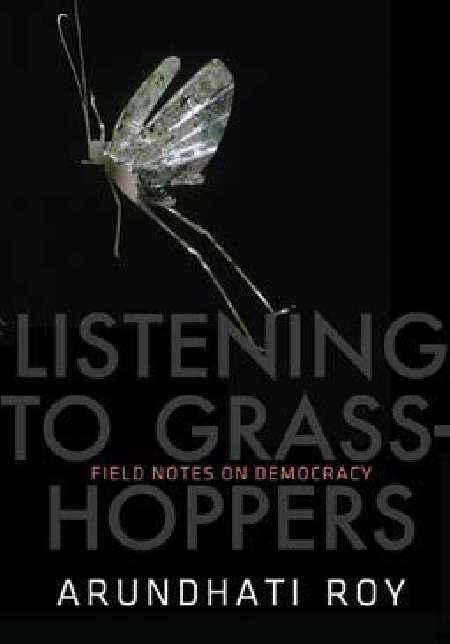Listening to Grasshoppers: Field Notes on Democracy Book Review  |
Man Booker winning author, Arundhati Roy, takes a investigating look at the underbelly of the world's oldest democracy in her new anthology of essays "Listening to Grasshoppers: Field Notes on Democracy" which is published this week.
"By democracy, I don't mean democracy as an ideal or an aspiration. I mean the working model: western liberal democracy, and its variants. Attempts to answer this question often turn into a comparison of different systems of governance and end with a somewhat prickly, combative defence of democracy. It's flawed, but it's better than anything else that's on offer," Roy said.
The compilation is typically Arundhati Roy - candid, chatty, lucid and probing - more like snapshots from all her earlier non-fiction works since 1999.
With intelligent political insight, she shows how the journey of Hindu nationalism and neo-liberal economic reforms, flagged off almost around the same time in the early 1990s, is now manifest in dangerous ways.
The book begins with an essay on the state-backed killing of Muslims in Gujarat in 2002, explaining how "progress and genocide" has always been comrade-in-arms. They either take place together or follow each other in a strange cycle of fate.
"Fascism's firm footprints has appeared in India. Let's mark the date: Spring 2002. While we can thank the US president and the coalition against terror for creating a congenial international atmosphere for fascism's ghastly debut, we cannot credit them for the years it has been brewing in our public and private lives... it breezed in after the Pokhran nuclear tests of 1998," Roy writes in her essay, "Democracy: Who's She, When She's At Home".
The argument makes sense.
In the essay, "How deep shall we dig", a text of the lecture that she delivered at the Aligarh Muslim University in 2004, she uses Kashmir to establish the Indian government's handling of terrorism along its margins - Jammu and Kashmir and in the seven sister states of the Northeast where the "schism between the real and the virtual world has turned into a place of endless speculation and potential insanity".
Roy brings POTA and allied terrorism-related laws under the scanner and poses a disturbing question - "Successful fascism takes hard work. And so does creating a good investment climate. Do the two work well together?"
"Azadi", another essay that first appeared in The Guardian in August 2008, gathers up a controversy - one that leaves most of us squirming in discomfort.
Roy pleads for an "azad Kashmir" saying "for all these years, the Indian state, known among knowing as a 'deep state', has done everything it can - subvert, suppress, represent, misrepresent, discredit, intimidate, purchase - and simply snuff out the voice of the Kashmiri people".
India needs 'azadi' from Kashmir just as much - if not more - than Kashmir needs azadi from India, she writes. Which is well, but the essay fails to address who makes up the Kashmiri people and the holes in history? Can an Azad Kashmir make room for all?
The concluding essay, "Nine is Not Eleven (And November isn't September) is perhaps the most soul-searching of the lot.
It is a spotlight on th 26/11 Mumbai terror attacks - published in The Guardian in December 2008. The essay, while describing the horrors of the blasts, as beamed across by television channels and the post-mortems that followed the live coverage, makes a pertinent point.
"Dangerous, stupid oversimplification like the police are good/politicians are bad... Tragically, this regression into intellectual infancy comes when people in India were beginning to see that, in the business of terrorism, victims and perpetrators often exchange roles," she writes, citing Kashmir as an instance.
The collection is thought-provoking, well-researched and worth reading.
But in retrospect, the thin line between reportage, editorial writing, sermonising and the fine art of non-fiction essay writing seems to overlap too frequently in the anthology.






